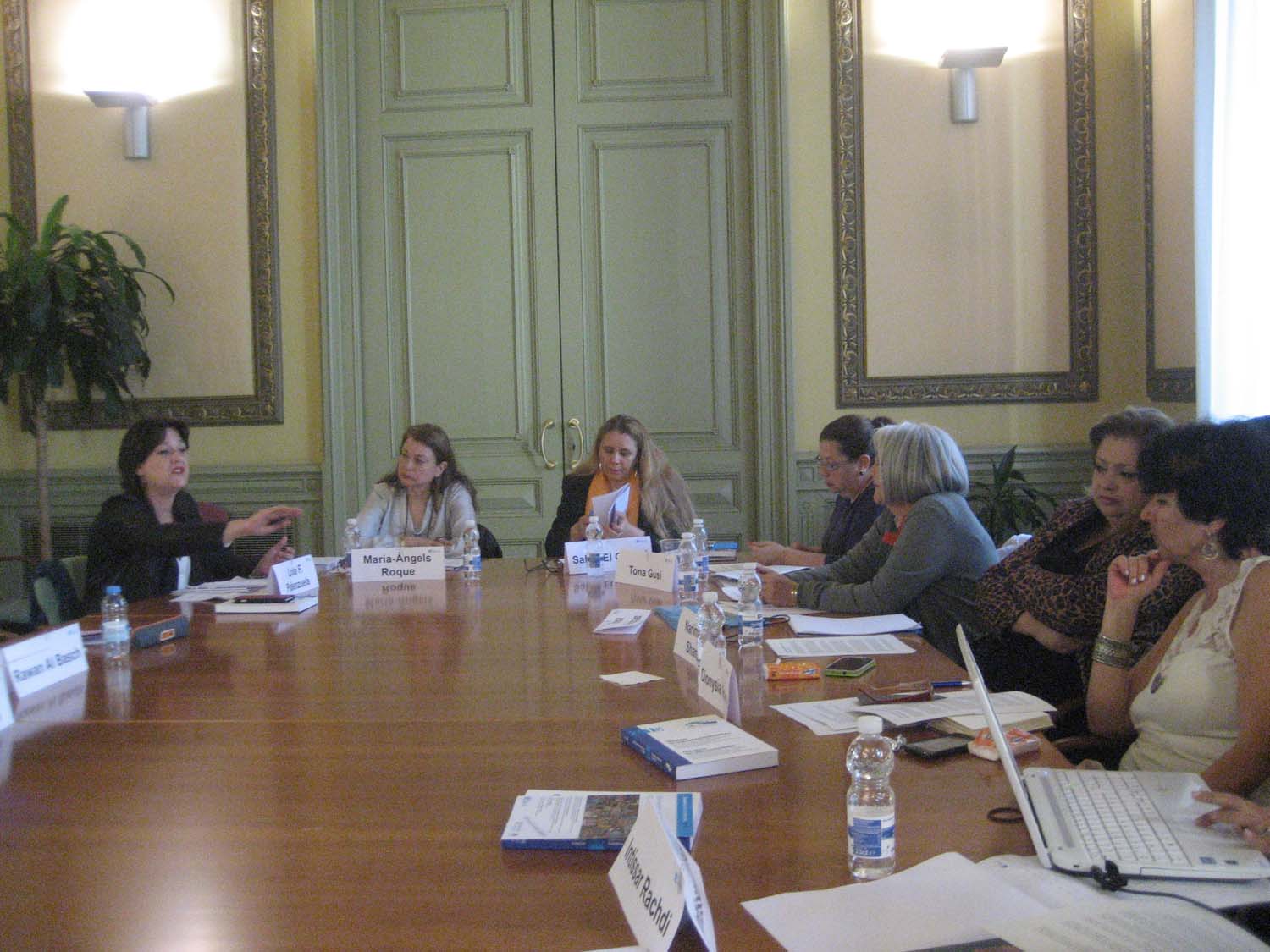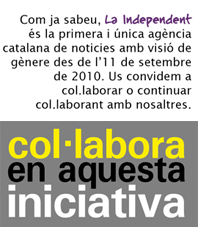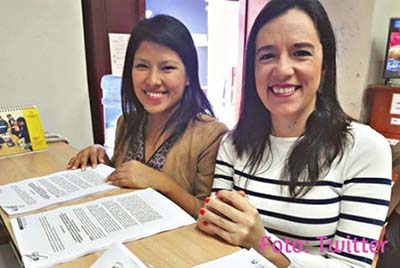
Lola F. Palenzuela a la dreta a costat de Abir Fekih. Foto Lídia Vilalta
We are aware and is unavoidable recognize that there has been an unquestionable progress over recent decades in journalism with a gender perspective. However, it is also evident the permanence of bad practices that continue anchoring the stereotypes drafting tables and skewed vision of a plural reality.
To end the current situation of discrimination against women in the world of journalism and communication is necessary to establish transversal networks that act in a coordinated manner in all areas. But we must go beyond the involvement and joint action of women’s organizations with other organizations, institutions and social agents, and the participation of women in decision-making centers of the newsrooms, both in the professional aspect –editing committees- as a union, through works councils and the unions.
Permanence of bad practices and the stereotypes
I think we are aware and is unavoidable recognize that there has been an unquestionable progress over recent decades in journalism with a gender perspective. However, it is also evident permanence of bad practices that continue anchoring the stereotypes drafting tables and skewed vision of a plural reality.
We also know the importance of the Media in building the social imaginary, educator role, reporting and public awareness. Therefore it becomes necessary to establish common strategies to advance and eliminate old patterns of discrimination that are still present today in these Media products developed and released to society through its various media.
This also affects the discrimination of journalists and communicators. And therefore is necessary to generate actions based on networking that enable organizations to work together journalists and communicators with institutions, social organizations, academic and unions.
Internationalize complaints and ‘alerts’
In this sense it is necessary to build networks among professionals as well as supporting existing ones. It is important to promote, through sustained support networks of journalists, and communicators local, regional, national and international, to serve as spokespersons and allow internationalize good practices, complaints and ‘alerts’ when occur situations of bad practices of persecution and violence against the professionals in their exercise of defending the right to freedom of information, expression and the press, in the context of human rights and the women’s rights.
But these networks have not only served to denounce bad practices and violations of the right to plural, truthful and equal information. Also, as an important objective, is the highlight and disseminate good practices carried out by the Media; we never stay alone in mainstream media. Also look at the local and community media. We need to spread its actions, its new methodologies and imaginative actions certainly they are doing.
Work with local Media and the third sector
In this sense a fundamental action is working with local media and the third sector means proximity, not because they are small their influence should be neglected, because if you work well programming it can count on great power penetration in the community.
There is certainly a great potential in these media, which have an important social impact in the community, urban or rural, which are inserted.
At the same time, we must help train and encourage their work with aid to help them move forward with their professional training and gear, in cases required, material, means to develop this work. Proximity media usually are the forgotten, while in many cases are the most persecuted and punished, all under the most absolute silence.

Lola Fdez. Palenzuela a l’esquerra, durante la seva intervencio. Foto Lídia Vilalta
Create spaces of support and surveillance
It is certainly important to create spaces of support and surveillance by powerful international organizations or regional basis to allow progress in this area of ??undoubted social influence. The cross action that brings together public, private and third sector, local, regional and national media, means would close a circle of action on good practice that promotes the change of the current model.
As for the labor and professional situation of journalists today discrimination is not different from that faced by women in other fields of work. Discrimination is evident in the data year after year show statistics, lower wages than their male counterparts, worse contracts, higher unemployment and an offensive promotion policy at headquarters and addresses.
In this sense it is necessary that women address our incorporation into another space must struggle, the councils, the unions of our companies, as well as the union’s bodies. Our own representation in these areas should be increased. We must therefore cut that trend. Thus, the authority vested in those spaces will get greater incidence to our proposals.
More women in works councils and newsrooms committees
Our role in these fields of power is necessary. We must co-lead the collective representation of the workers in our workplaces because it is from there, from where we can exert more force on monitoring and reporting of gender inequality in the daily tasks of newsrooms and on the scale of responsibilities. Not forgetting of course the quality of the information we make and serve the citizens.
We must be clear that our struggle runs along all roads. Only from the cross we can work and tackle the problems that today suffer communication and journalism. We must therefore get involved as much as possible in decision-making. We have to go and participate in the councils of our companies. Ensure compliance with labor regulations, negotiate collective agreements, source of law as a legal act it is enforceable and reportable to the Labor authorities and Courts. Having a presence on the drafting committees that regulate the professional aspects of the media, the rights and duties of all journalists men and women and their relation to codes of conduct.
Portar als centres de treball l’esperit de la 1325
There are many fronts that we have to stay to experience real change. And we have to be in all of them. We should not either, as I said, abandoning our role in the Trade unions, on the contrary, we must increase co-leading these spaces where women also see us relegated. Let’s tackle these fronts. Move to co-direct trade unions, works councils, editorial boards of our workplaces.
If in Resolution 1325 ‘Women, Peace and Security’ United Nations is stressing the need of increasing the representation of women in management and resolution of conflicts and in the negotiating tables of peace, in our businesses, our newsrooms in Spain, Russia, Tunisia and Ecuador should be the same.
Our workplaces are also areas of conflict where you should look for causes and offer solutions. And so we must be there, to the decision-making centers bring the spirit of 1325. Our voices have to listen. That is the way.
The 1325 (2000) Resolution of the United Nations in Article 1, urges Member States to ensure that increased representation of women at all levels of decision-making institutions and national, regional and international mechanisms for prevention, management and conflict resolution.
Lola Fernández Palenzuela is Journalist and PhD in Communication. She directs the Department of Communication at the Euro-Arab Foundation; is Secretary of Equality at the Federation of Unions of Journalists (FeSP) and member of the Gender Council of the International Federation of Journalists (IFJ).





